- Home
- Greg Van Eekhout
Voyage of the Dogs Page 10
Voyage of the Dogs Read online
Page 10
“Lopside, report,” Champion demanded.
“I’m fine. Release the clamps.”
A small part of him hoped there’d be a malfunction and that the clamps wouldn’t release and that Bug or Champion or even Daisy would come up with a brilliant, last-minute search-and-rescue plan that didn’t involve Lopside venturing out all by himself in a fragile metal box. But he heard the now-familiar ka-clunk of the clamps releasing.
He leaned forward and nudged the maneuvering control with his nose. The tiny nozzle on the back of the Rover hissed, and the Rover floated out of the airlock, into the endless well of inky black.
Bug guided Lopside through a couple of maneuvers that involved brief firings of the nozzles until he was turned in the direction of the asteroid field. He couldn’t make out any asteroids by naked eye. It was too dark, the asteroids too far away.
Maybe the sensors were wrong. Maybe the reason he couldn’t see anything out there was because nothing was out there. But then he caught a brief glimmer, a distant rock catching a reflection off the even more distant sun.
Champion made him report in to make sure he wasn’t suffocating or overheating in the Rover, and then there was nothing left to do but give the nozzles a long burst to send him out, away from the dome.
Lopside gnawed on a particularly stale ERP. He wondered if Bug had gone out of his way to equip the Rover with the stalest ERPs he could find. If so, it was a smart move, because it let Lopside pass time by stubbornly chewing. He also entertained himself with ERP burps. In fact, a couple of hours into the journey, he burped out a song about Daisy.
Was he the first dog ever to musically burp in space?
Champion would have thought it odd and maybe even bad to be burping during a mission of such importance. But eating and burping and playing and working—these were the things he missed about daily life on the Laika, being with Roro and the rest of the crew, without every second of every minute being about surviving or enduring cold and hunger and eking a few more hours from the feeble batteries.
If only he could find human survivors, then they’d figure out a way to get the dome to Stepping Stone.
Humans and dogs, together.
After a lot of eating, burping, thinking, and a million check-ins with Champion, Lopside neared the asteroid field.
What had been nothing more than tiny triangles on a display screen were now tumbling boulders and small mountains. Some were sharp-edged and glittered with bright flecks of mineral. Some were lumpy masses of rock that looked like colossal potatoes, pitted with craters.
Lopside gave the Rover a few propellant bursts to match the asteroids’ velocity and looked back toward the dome. He couldn’t see any trace of it. It was too distant, its lights too dim. Lopside had never been so far away from another living creature.
To keep himself from panicking, he thought about Bobbie the Wonder Dog, who’d crossed 2,500 miles to find his family. Alone in the desert, or high in the mountains, maybe Bobbie had been even farther from humans and other dogs than Lopside was now. And he’d come out of it all right.
Lopside the Wonder Dog.
He liked how that sounded.
An object drifted by. Narrow and about a foot long, it didn’t look like a hunk of rock. It looked human-made. Lopside gave the Rover a quick burst and entered a cloud of small, glittering bits of metal. Most of them were just fragments of something unidentifiable, but there were also screws and rivets and nuts. There was a torn and fluffy thing that looked like seat padding.
He knew what he was looking at. But it was the unthinkable. He held out hope it was something else until a larger piece almost hit the Rover. It was a metal plate with a few painted letters on it. Lopside made out an L, and an I, and an F, and an E.
LIFE.
There was only one thing it could be.
He swallowed and activated the radio. “This is Lopside,” he said. “I’ve found the lifepod.”
A crackle, and then Champion’s voice: “Report lifepod’s condition.”
Lopside didn’t want to answer. Because once he barked the words, once he heard them in his own head, it would be true, and he didn’t want it to be true.
“Lopside? Report.”
“It’s in pieces,” Lopside said. “The lifepod is in pieces. It’s been destroyed.”
Twenty
A FULL MINUTE WENT BY without anyone saying anything over the radio. Lopside imagined his packmates back at the dome, silenced by disappointment, wondering what to do now. Lopside himself was just numb. He’d expected to find survivors. He’d expected to save them.
Dogs and humans, together.
Lopside and Roro, together.
His hopes, like the lifepod, were smashed into chunks and crumbs.
Champion’s voice came on the radio. “See if there’s anything to salvage. Engine parts, supplies, anything we can use.”
Lopside tried to bark. Only a whimper came out. He swallowed his grief and tried again. “Affirmative,” he managed.
He turned his attention to the debris field. Most of it was just tiny bits the size of kibble pieces. Here and there he spotted a length of torn hosing, or a random fragment of metal. He doubted even Bug could find a use for any of it. But then he set eyes on a simple gray capsule the size and shape of a watermelon.
He gave the Rover a squirt and zipped close to it.
Was it . . . ?
“Laika dome, come in.”
“Rover, this is Laika dome,” Champion’s bark answered.
“I’ve found the lifepod’s singularity core containment unit.”
When he heard back from the dome, it was Bug. “Do you see anything that looks like an anti-graviton generator?”
Lopside knew what Bug was thinking. A singularity core and an anti-graviton generator were the two components of a Tesseract motor. Under normal circumstances they wouldn’t dream of using a Tesseract motor within a planetary system so close to gravitational fields. But these weren’t ordinary circumstances. If there was the smallest, itty-bittiest chance of using the motor to warp space and shorten the distance between the dome and Stepping Stone, it might be worth it.
But it was pointless to think about. An anti-graviton generator would be as large as a refrigerator, and there was nothing even close to that size in sight.
“Negative on anti-graviton generator,” Lopside said.
“Even a functioning singularity core is no use without anything to generate and control anti-gravitons. But you might as well grab the containment unit. Better than returning with empty paws.” Lopside could hear the disappointment in Bug’s barks.
Champion replaced Bug on the radio. “There’s nothing else you can do out there, Lopside. Grab the unit, turn around, and come back to the dome,” she ordered.
“Affirmative.”
Lopside reached out with one of the Rover’s arms and closed its claw around the capsule. He was leaning for the maneuver control when a bright, sharp sound filled the Rover’s compartment.
Bip-bip-bip. Beep-beep-beep. Bip-bip-bip.
“Laika dome, come in!” Lopside barked, trying not to pant with excitement. “Did you hear that?”
Again: Bip-bip-bip. Beep-beep-beep. Bip-bip-bip.
“Laika dome, this is Rover, come in.”
Lopside waited for a response from the dome. Seconds ticked by, and none came.
“Champion, this is Lopside, do you read me?”
When there was still no answer, Lopside looked back in the direction of the dome. A great whale of rock slowly drifted across his view. The asteroid must be blocking the dome’s radio signal. It was probably blocking Lopside’s, too. And maybe that was why the SOS signal only came in sporadic bursts. If an asteroid crossed the path of whoever or whatever was sending it, then the radio signal would be blocked until the asteroid was clear.
And this one was a huge asteroid, longer than the Laika, and slow as a cloud on a still day.
Lopside knew his signal wouldn’t go through, but he felt
he had to at least try: “Come in, Laika dome. Champion? Bug? Daisy?”
Just as he predicted, his radioed barks went out into the void without answer.
Had Bobbie the Wonder Dog had a radio?
No, he had not.
Lopside would have to do without.
The SOS signal, however, continued to blare.
Lopside knew he ought to wait until the big asteroid passed and then head back to the dome. Instead, he gave the Rover a burst and went deeper into the asteroid field.
The field grew thicker. He was in the shadows of giants, a mouse among elephants. If he ran into trouble out here, his pack would never find out what had happened to him.
“Focus on the mission,” he scolded himself.
He was searching for anything that didn’t look like the rough rock and metal of an asteroid. A piece of lifepod wreckage. Maybe even a piece of the lifepod that humans could survive in, like the crew compartment. He wished he could use his nose in space, because if he could, he knew he’d be able to sniff out a human.
Massive boulders tumbled lazily all around him. One was coming awfully close, and right before he took his eyes off it, he caught a flash of light.
Probably just a reflection of starlight off some shiny bit of material on the asteroid’s surface.
Nothing to get excited about.
But if that was true, why was his tail thumping against the sides of the compartment?
The asteroid was still rolling, and the area from where the flash had originated passed out of view.
Lopside tried to contact the dome by radio again, but there was still no answer.
The SOS was louder than ever.
“This is Lopside of the Earth ship Laika. Do you read?” This time he wasn’t trying to reach Champion at the dome. He was trying to reach the source of the SOS.
Still, nothing.
Maybe whoever was sending out the SOS had a transmitter, but not a receiver.
Maybe he was hearing a distress call sent out automatically by a piece of the lifepod’s emergency system, and there was no one and nothing left to rescue but another smashed piece of space junk.
Maybe whoever was putting out the signal couldn’t respond.
Maybe there was no one alive left to respond.
Lopside spun the Rover around and gave it a burst to catch up to the asteroid.
It loomed below him, at least a few miles across. As he brought the Rover closer to its surface, he could make out the detail of its terrain. He hovered several hundred feet above deep craters, their bottoms hidden in darkness. Valleys cut through the rock, with cliffs and ridges.
He descended and began skimming over the surface from a few dozen feet above. The Rover’s work lamp cast a spotlight but didn’t catch a sign of anything human-made, not even wreckage.
Then, a flash.
Lopside guided the Rover into the crater. The rim rose above him like the lips of a giant stone mouth. He followed the slope of the crater down, toward its floor, keeping his eyes fixed on the flashing light. If it was coming from lifepod wreckage, or even just a piece big enough to shelter the crew, surely he would have spotted it by now. But there was only the pulsating light and the insistent bips and beeps of the SOS.
He kept the Rover moving at a slow pace, his eyes darting over a landscape littered with rocks ranging from pebbles to slabs five times the size of Daisy.
There it was, the source of the light. A scuffed and dented cylinder about the size of a coffee cup. The light it gave off wasn’t particularly bright. He’d imagined a great bonfire, a flaming tower, blasting the location of survivors like a rocket engine. But this was just a lone emergency beacon.
Lopside activated one of the Rover’s arms. He reached out with it and switched off the beacon. The light died, and the SOS fell silent.
It took a few seconds for his eyes to adjust to the darkness. And once they did, he saw it: At the foot of a boulder, almost completely buried in gravel, was a space suit glove. He stared at it a moment, not quite believing his eyes.
With the gentlest burst, he brought the Rover just inches above the glove and started scraping the gravel away with the claw. The asteroid had almost no gravity, and with every scrape pebbles and dust floated up to form a cloud. He didn’t want to obscure his vision, so he dug slowly, deliberately.
The forearm of a long-term survival space suit emerged. Then the chest plate. Stenciled on it was the name Laika.
A whimper built up inside Lopside’s throat, and he barely held it back.
Back in the dome, Champion had given Lopside tips on search-and-rescue operations. There was rescue, which was saving a living person. And there was recovery, which meant bringing back a corpse.
Lopside kept on with the grim business of unburying the suit.
When he excavated the helmet, he began to hope. Hope was a mistake. He didn’t want to hope, because there was very little reason for it. But he couldn’t help it. His tail thwacked against the sides of the Rover’s compartment. His ears stood at attention, even the floppy one. Maybe hope was his instinct.
He gingerly scraped away at the gravel and dust covering the helmet’s faceplate. The dust formed a fine coat, and the claw was too crude a tool to do a good job of clearing it off. The very last thing he wanted to do was put a crack in it.
Finally, a face began to emerge. A human face. He couldn’t make it out in the dimness of the crater. With a numb paw, he directed Rover’s work lamp into the helmet.
The face was thin, the lips dried and cracked. A layer of frost covered the eyelids and cheeks.
It was her.
It was Roro.
Twenty-One
LOPSIDE’S HOWL OF SADNESS ECHOED in the Rover’s compartment, but he was the only one who could hear it.
He let himself keen for a total of six seconds. Six seconds to get it out of his system and clear his head so he could return to work.
Of all the outcomes he’d feared, this was the worst. Roro, dead. Roro, who’d rescued him from beneath a tree. Roro, who’d given him a bath to wash the mud out of his coat (which he hadn’t enjoyed), but then had wrapped him in a thick, warm towel. Roro, who’d let him sleep on her bed. Roro, who’d convinced Space Operations that Lopside was smart enough and determined enough to be trained for space.
He owed Roro everything. Humans and dogs, always together, and she was his human, and he was her dog.
Six seconds was all he gave himself to howl in pain.
There was still a job to do, and he was still a Barkonaut.
He continued digging to expose more of Roro’s suit. There was a loop on the top of the life-support pack, and Lopside closed the Rover’s claw around it. He was about to give the Rover a burst to start lifting Roro out of the crater when her fingers flexed.
“No,” he told himself. He’d just imagined it. Or he’d accidentally shifted her suit and caused the movement himself.
Her fingers flexed again.
“Roro?” he barked. “Roro, it’s me, Lopside!”
There was no answer. Not at first. But then Roro’s eyelids twitched. Tiny flecks of frost fell away from her eyelashes, and she opened her brown eyes and stared directly into Lopside’s.
They were the most miraculous eyes Lopside had ever seen, because they belonged to Roro, and she was alive.
Her weak voice crackled over the Rover’s radio. “I’m dreaming.”
“No, you’re not. It’s me, Lopside. And I’m here to rescue you.”
Not recover. Rescue. He had no idea how she’d gotten here, how she was still alive. But those answers would wait. Right now, the only thing that mattered was getting her back to the dome.
“What’s your condition?” he asked her, the way Champion would, making a question sound like an order.
She didn’t answer. Maybe she was too weak to answer. But then Lopside remembered she wouldn’t be able to, even if she’d been strong and healthy. All she could hear over the radio were barks. With him inside the Rover, sh
e couldn’t see his body language. She couldn’t see his posture, or the angle of his ears, or the action of his tail, so her translation chip couldn’t convert his dog communication into human language.
Solve the problem, Lopside thought to himself.
Then, to Roro, he barked: “Bark-bark-bark. Woof-woof-woof. Bark-bark-bark.”
It was the shortest, simplest message he could think of.
Her eyes snapped fully open.
“Morse code? Oh, you clever dog.”
“Report condition,” he asked her again, this time barking in code.
“Weak. Cold.” Her voice was a whisper.
“Report condition of survival suit.”
She closed her eyes and didn’t respond.
“Roro!” he barked as loud as he could. Roro’s eyes popped back open, startled awake. “Report condition of survival suit,” he code-barked again.
“Functional, but battery’s at two percent.”
That would explain why she was cold. Her suit was designed for survival, but even under the best conditions, it could only keep a human alive for two days, maybe three. Who knew how long she’d been in her suit, buried under gravel on the asteroid. Eventually, her oxygen recycler would fail, too, and then Lopside’s mission would be a recovery job for sure.
He checked his own battery power. The Rover was down to thirty percent. That was enough to get him back to the dome, but not if he also used his battery to power Roro’s suit.
He didn’t see any other choice.
“How are the other dogs?” Roro asked. It sounded like she was having a hard time moving her lips.
“Soon,” he code-barked. He hoped she understood he meant that she’d see them soon. Every message took a long time to bark, and he didn’t want to waste time or breath.
The battery compartment on Roro’s space suit was a box half the size of a loaf of bread, attached to her hip. Nosing the claw arm controls, he pried the cover off Roro’s battery pack, exposing a black brick attached to cables: her suit battery.
Next, he extended the claw arm to its full length. His own battery pack was on the back side of the Rover. He couldn’t even see it from inside the tool compartment. After too much fumbling, he gave up the delicate approach and just knocked the claw against the case lid: klunk, klunk, klunk. He didn’t know he’d popped the lid off until he saw it float away.

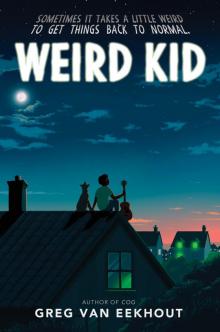 Weird Kid
Weird Kid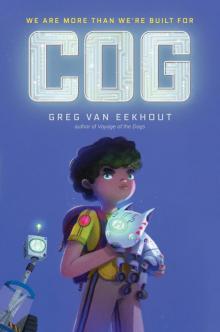 Cog
Cog The Boy at the End of the World
The Boy at the End of the World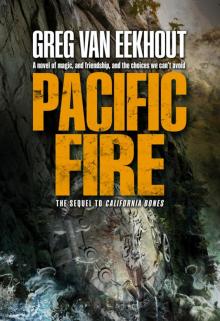 Pacific Fire
Pacific Fire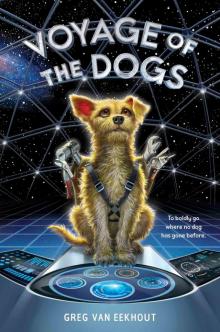 Voyage of the Dogs
Voyage of the Dogs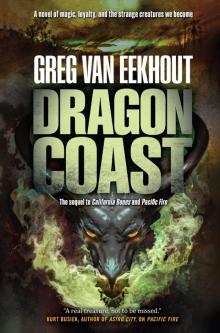 Dragon Coast
Dragon Coast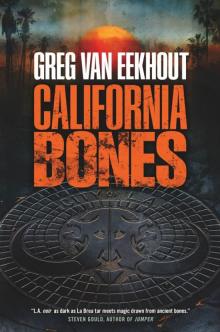 California Bones
California Bones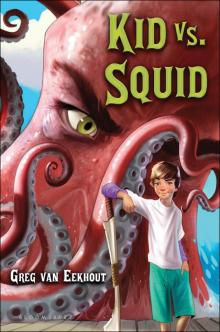 Kid vs. Squid
Kid vs. Squid